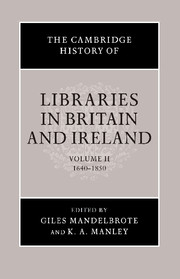Book contents
- Frontmatter
- 1 Introduction: the changing world of libraries – from cloister to hearth
- PART ONE THE EXPANSION OF BOOK COLLECTIONS 1640–1750
- 2 Ancients and moderns: cross-currents in early modern intellectual life
- 3 Libraries, books and learning, from bacon to the enlightenment
- 4 Opportunities for building collections and libraries
- 5 Libraries for school education and personal devotion
- 6 Libraries for the parish: individual donors and charitable societies
- 7 Endowed libraries for towns
- 8 Libraries in university towns
- 9 Ecclesiastical libraries: libraries for the higher clergy
- 10 Libraries for antiquaries and heralds
- 11 Professional collections: libraries for scientists and doctors
- 12 Personal owners of books
- 13 Library buildings and fittings
- 14 Baroque librarianship
- PART TWO LIBRARY DEVELOPMENT AT A LOCAL LEVEL
- PART THREE PROVINCIAL AND METROPOLITAN LIBRARIES 1750–1850
- Select bibliography
- Index
- References
11 - Professional collections: libraries for scientists and doctors
from PART ONE - THE EXPANSION OF BOOK COLLECTIONS 1640–1750
Published online by Cambridge University Press: 28 March 2008
- Frontmatter
- 1 Introduction: the changing world of libraries – from cloister to hearth
- PART ONE THE EXPANSION OF BOOK COLLECTIONS 1640–1750
- 2 Ancients and moderns: cross-currents in early modern intellectual life
- 3 Libraries, books and learning, from bacon to the enlightenment
- 4 Opportunities for building collections and libraries
- 5 Libraries for school education and personal devotion
- 6 Libraries for the parish: individual donors and charitable societies
- 7 Endowed libraries for towns
- 8 Libraries in university towns
- 9 Ecclesiastical libraries: libraries for the higher clergy
- 10 Libraries for antiquaries and heralds
- 11 Professional collections: libraries for scientists and doctors
- 12 Personal owners of books
- 13 Library buildings and fittings
- 14 Baroque librarianship
- PART TWO LIBRARY DEVELOPMENT AT A LOCAL LEVEL
- PART THREE PROVINCIAL AND METROPOLITAN LIBRARIES 1750–1850
- Select bibliography
- Index
- References
Summary
For Meric Casaubon (1599–1671), the study of spirits, including the soul, devils and angels, was properly a part of physics, a discipline treating natural entities. This formed part of the arts curriculum, whose purpose was the inculcation of the general learning that Casaubon, an early critic of the Royal Society of London, applauded. To conduct his own investigations into the activity of spirits, Casaubon drew on what he called ‘converse with books’. This exchange took place in part within his own library, but to a greater extent through reading carried out in those of others, notably that of Sir Thomas Cotton in London, where Casaubon gained access to the manuscripts of the Elizabethan magus John Dee.
During the century or so after 1640, the use of collections of books and manuscripts was unquestionably part of the work of scholars such as Casaubon, active in the disciplines of natural philosophy. But those disciplines embraced a great deal that would currently surprise practitioners of ‘science and medicine’. Debates about the content and form of natural philosophy often pitted knowledge that could be obtained from experiment and practice against wisdom derived from books.
Francis Bacon (1561–1626), the philosopher on whose ideas many of the proponents of intellectual reform based their programmes, did not make explicit mention of libraries in his scientific utopia, The new Atlantis (1626), although the descriptions of several of the categories of employees with whom Bacon peopled ‘Salomon’s House’ suggested some of the uses to which he believed libraries could be put. ‘The Merchants of Light’ thus ‘bring us the books, and abstracts, and patterns of experiment of all other parts’; the ‘Depredators’ also ‘collect the experiments which are in all books’; finally, the ‘Compilers’ were supposed to ‘draw the experiments … into titles and tables’.
- Type
- Chapter
- Information
- The Cambridge History of Libraries in Britain and Ireland , pp. 158 - 172Publisher: Cambridge University PressPrint publication year: 2006



